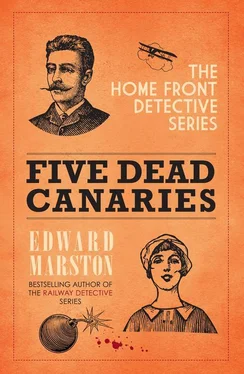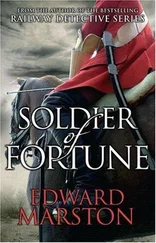Edward Marston - Five Dead Canaries
Здесь есть возможность читать онлайн «Edward Marston - Five Dead Canaries» весь текст электронной книги совершенно бесплатно (целиком полную версию без сокращений). В некоторых случаях можно слушать аудио, скачать через торрент в формате fb2 и присутствует краткое содержание. Жанр: Исторический детектив, на английском языке. Описание произведения, (предисловие) а так же отзывы посетителей доступны на портале библиотеки ЛибКат.
- Название:Five Dead Canaries
- Автор:
- Жанр:
- Год:неизвестен
- ISBN:нет данных
- Рейтинг книги:4 / 5. Голосов: 1
-
Избранное:Добавить в избранное
- Отзывы:
-
Ваша оценка:
- 80
- 1
- 2
- 3
- 4
- 5
Five Dead Canaries: краткое содержание, описание и аннотация
Предлагаем к чтению аннотацию, описание, краткое содержание или предисловие (зависит от того, что написал сам автор книги «Five Dead Canaries»). Если вы не нашли необходимую информацию о книге — напишите в комментариях, мы постараемся отыскать её.
Five Dead Canaries — читать онлайн бесплатно полную книгу (весь текст) целиком
Ниже представлен текст книги, разбитый по страницам. Система сохранения места последней прочитанной страницы, позволяет с удобством читать онлайн бесплатно книгу «Five Dead Canaries», без необходимости каждый раз заново искать на чём Вы остановились. Поставьте закладку, и сможете в любой момент перейти на страницу, на которой закончили чтение.
Интервал:
Закладка:
In their matching uniforms, it was difficult to tell them apart. Maureen Quinn had been part of this female army and might, in time, return to it. Florrie Duncan, Agnes Collier, Jean Harte, Shirley Beresford and the musician, Enid Jenks, would never come back to the Section. Keedy thought the work unsuitable for women and bewailed the fact that war had dulled the sensibilities with regard to what was appropriate to the two genders. As he was led around by Kennett, the workers went up in his esteem. In spite of their unflattering clothing, he could see that many of them were young, shapely and very attractive. But they were committed to a job that would round their shoulders, put furrows in their faces and paint them with such a telltale yellow sheen that their social lives would be badly affected. Even the most loving husbands would be repelled by the change in their wives’ appearance and those in search of marriage proposals would be severely handicapped. In serving their country so willingly, they’d made unwitting sacrifices.
Keedy was glad to step out into the fresh air again. He turned to Kennett.
‘Thank you for showing me round,’ he said.
‘Now you know what those five women did when they were here.’
‘I had no idea that conditions were so bad.’
‘They compare favourably with conditions in any of the other factories,’ said Kennett, defensively. ‘We do everything possible to minimise the danger to our workforce and to treat them with consideration.’
‘Granted — but it’s still worrying to see women doing such work.’
‘It’s an unfortunate necessity.’
‘What will happen when the war ends?’
‘Demand for munitions will cease,’ replied Kennett, ‘so we won’t need to maintain such a high daily output. Men who return from the front will naturally expect jobs and they’ll take priority over women, many of whom will have to be released to search for other employment.’
‘The damage will already have been done,’ said Keedy, sadly. ‘Who’ll take on women who look like yellow, jaundice victims?’
‘That’s a regrettable side effect of working here.’
‘Shouldn’t they be able to claim compensation?’
‘No,’ said Kennett, sharply, ‘that’s out of the question. They understood when they first came here what the job entailed. The women accepted the risk. They can’t turn round now and say that they deserve some sort of compensation. Where’s the money to come from to pay them? We’d go bankrupt. If we set a precedent with munition workers, it would be disastrous thing to do.’
It would also be a civilised gesture, thought Keedy, but he didn’t wish to have a dispute with the works manager. Sympathetic as he’d been to the plight of the five victims, there were clearly limits to Kennett’s compassion. First and foremost, he had to maintain production at whatever cost. Workers were therefore seen as mere cogs in a machine rather than as human beings with needs and rights. One of Keedy’s questions was answered. When Florrie Duncan had come to his office to demand longer lunch breaks, she obviously got very short shrift from Bernard Kennett.
After thanking his guide once more, Keedy took his leave and walked off the premises. The tour had served its purpose. He’d not just been interested to see how hard and unremittingly the women had worked, he was keen to note how often they came into contact with male employees. The latter were not just confined to management roles. Many worked alongside the women, doing the skilled tasks that were beyond them. Then there were drivers, porters, cleaners, kitchen staff and dozens of other men at the factory. Many of them came into daily contact with the munitionettes. Keedy had observed more than one of them shooting sly glances at the women. Could the bomber they sought be working somewhere on the site? Thwarted passion was a powerful emotion. Keedy had seen it drive people to do incredible things. The shells manufactured at Hayes were lethal but unwelcome sexual desire could be destructive as well. Was that what had cost five women their lives? It was an open question.
Ellen Marmion did what she could to help the war effort by working as a volunteer with groups that organised food parcels to be sent to the front or knitted gloves and other items for the soldiers. Aware of the privations suffered by those trapped in deep, muddy, rat-infested trenches, she strove to ameliorate their lot in her small way. On her way home after another session with the knitting needles, she passed a newspaper vendor and saw the headline emblazoned on his display board — FIVE DEAD CANARIES. Since the lunchtime edition related to the case on which her husband and future son-in-law were working, she bought a copy and glanced at the front page. Marmion looked up solemnly at her from a stock photograph but it was tiny by comparison with the photo of the doomed outhouse in Hayes. Seeing the extent of the damage made her stomach heave. It was the work of someone cruel and pitiless. Marmion and Keedy were in pursuit of the man. Not for the first time, she was reminded of the perils that came with a job at Scotland Yard. Someone who could kill five young women in cold blood wouldn’t hesitate to murder two detectives. Folding up the newspaper, she thrust it under her arm and scurried home.
Ellen was not simply worried about their safety. She was alarmed that her daughter was, as she saw it, being bullied at work by a jealous superior. There was nothing that could be done to alleviate the situation. She was also disturbed by her husband’s reluctance to fully accept Alice’s choice of husband. While Ellen had been thrilled at the news, it had been an unpleasant surprise for Marmion and his unspoken objections remained. Most troubling of all, of course, was the eternal anxiety about their son, Paul, stationed in France near the Somme and sending infrequent letters that complained of boredom and bad living quarters. Some of the friends who’d joined up with him at the start of the war had either been killed or sent home with missing limbs. She prayed daily that Paul’s name would not be added to the casualty list.
Trying to subdue her nagging concerns, she soon had something else to worry about. It started to rain and she had no umbrella. Almost without warning, the skies opened and the downpour began. Ellen had a coat and hat but they were inadequate protection against the driving rain. She was soaked within minutes. The storm put more speed into her legs and she practically sprinted over the last fifty yards. When she reached the shelter of her porch, she paused to get her breath back. Having spent its fury, the storm now abated and patches of blue sky peeped through the clouds. It was too late for Ellen. She’d been well and truly drenched.
When she let herself into the house, however, she saw something which banished all of her anxieties at once. It was a letter with distinctive handwriting on it. Paul had written to them again at long last. With a whoop of pleasure, she snatched up the letter from the floor. Dripping over the hall carpet, she tore it open.
‘When were you told the news, Mr Jenks?’
‘It was when I got back from work last night.’
‘You have my utmost sympathy.’
‘Thank you, Inspector.’
‘Is that a photo of Enid on the piano?’
‘Yes,’ said Jenks. ‘If she wasn’t practising on her violin, she’d be sitting at the piano. Music was everything to Enid. She could play anything. It was because she was so well taught. My wife was a wonderful pianist as well. She wanted one of the children to learn how to play and the boys weren’t interested. Enid was. She had enough interest for both of them.’ He touched Marmion’s arm and lowered a voice as if about to impart a secret. ‘The vicar approached us, you know. He asked if Enid would be interested in learning the organ.’
Читать дальшеИнтервал:
Закладка:
Похожие книги на «Five Dead Canaries»
Представляем Вашему вниманию похожие книги на «Five Dead Canaries» списком для выбора. Мы отобрали схожую по названию и смыслу литературу в надежде предоставить читателям больше вариантов отыскать новые, интересные, ещё непрочитанные произведения.
Обсуждение, отзывы о книге «Five Dead Canaries» и просто собственные мнения читателей. Оставьте ваши комментарии, напишите, что Вы думаете о произведении, его смысле или главных героях. Укажите что конкретно понравилось, а что нет, и почему Вы так считаете.












